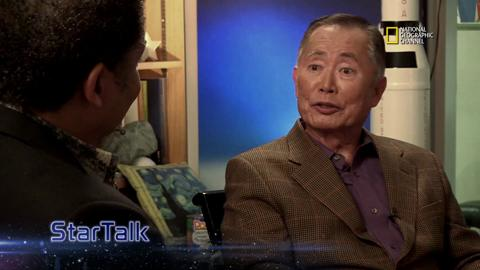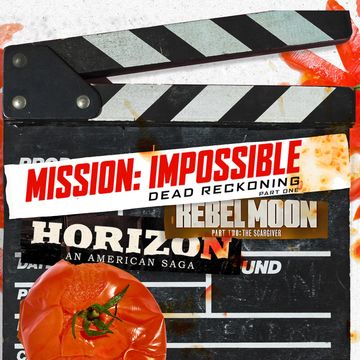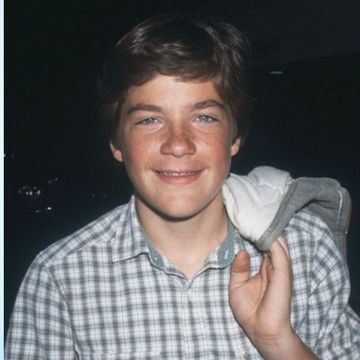Neil deGrasse Tyson's new late-night talk show, Star Talk, premieres Monday, April 20, at 11 p.m. ET, on National Geographic Channel.
Congratulations on the National Academy of Sciences award.
Oh! I didn't realize how loudly it got announced.
If I found out about it, it must have been loud.
Part of me just wants to stay home and keep working rather than collecting an award.
Not a bad thing to be given an award for spreading knowledge, considering the strain of anti-intellectualism in American culture.
I don't think of what I do as spreading knowledge. The phrase "You're lecturing me" is never a compliment. So I realized that's not what I should be doing if I have any interest in compelling people to become scientifically literate.
What's your secret?
I've found that no one complains about pop culture being a source of someone lecturing to them. If someone's telling you about Kim Kardashian, you're not going to accuse them of lecturing to you. If I can explore an intersection between pop culture and science literacy, then it generally will not come across as a lecture. You're surfing a wave already created by a pop-culture force. During the Super Bowl, one of my tweets was "A 50-yard field goal, in the University of Phoenix Stadium, deflects about one-third inch to the right due to the earth's rotation." Now, we've all seen field goals that just hit the post and bounce out, so the rotation of the earth prevented a goal! Everyone is interested in the Super Bowl and long field goals, and I judged that there would be deep curiosity in the fact that the rotation of the earth could affect the outcome of a game.
A third of an inch? That seems like a dramatic effect, actually.
There are other stadiums where it would be half an inch. It depends on the angle of the stadium relative to the longitude.
Did you put any money on the game?
I don't bet on things I can't control. . . . Actually, I enjoy roulette.
Why roulette?
It's the purest of random. If I'm ever walking through a casino, the roulette will call to me and I'll bet on prime numbers just for fun.
I love a good prime number.
Who doesn't love a good prime number?
This morning, I finished watching an interview that Stephen Colbert conducted with you. You conversed about religion. I really want to believe in a soul. Is there some essence?
Well, we live in a free country, which allows you to believe what you want. Because you think that something is true does not require that it is objectively true. The value of science concerning itself with objective truths is that we can make decisions and statements that affect everyone, which is why legislation really should be based on objective truths, not what is going on in your head.
In my memoir, I've written that when I die I want to be buried so that the energy content of my body will not go to the air or to space, which is of no use to any other life form at all. I would like my energy to be returned to the flora and fauna upon which I have dined my entire life. And so if you want to call that energy your "soul," okay, but it's in a very different form at that point. It's being shared with other animals and plants. Generally when people think of a soul, they think of their identity existing without the corporeal body and then still retaining some sense of yourself. There is no evidence that that happens. But for belief, evidence doesn't matter.
That's what faith is.
Here's something that intrigues me: If you have faith, you believe regardless of the evidence, yet if there's ever evidence to support faith, everyone goes to it and points to it.
A tortilla that resembles Jesus!
Everyone goes to it.
People will always want evidence. A random universe is a frightening universe for most people. It's terror.
Doesn't have to be.
Did you grow up religious? Was there a point in time when you consciously moved away from a tradition or were you always a freethinking guy?
I was raised Catholic. But if someone says I was raised in some religion, that's insufficient information to actually know what was going on. The real question is Was the religion in the household? The answer is no. Important decisions in the household were executed rationally and secularly. So as a result, the foundations of my reasoning derive not from religion but from the rational analysis of circumstances.
Today, waiting for the train, I stepped into the sunlight to warm up, and because I'm coming to eat lunch with you, I'm thinking: What an amazing thing that there is this star and I can literally feel it warming me.
There are two ways you can receive energy from your environment: One is molecules bumping against you. That's the air. The other is radiative energy. That's what you're feeling from the sun. When they say "Get out of the sun, out of the heat," the air is the same temperature; it's just you're exposed to sunlight.
Nature is wonderful and terrifying at the same time.
NDT: Nature is not here to keep you alive. It has just as many ways to kill you as it does to sustain you. And if you cherry-pick this fact, you are left thinking that earth is some haven for life, but 96, 97 percent of all species that ever lived on earth are now extinct from the actions of the earth itself and an occasional asteroid to stir the pot.
When I was a kid, Pluto was a planet. I feel bad for Pluto.
NDT: The problem is not whether Pluto is a planet. The problem is the enumeration of the planets. "There are nine planets. What is the name of the fifth planet?" There's the false feeling that the memorized sequence from the sun is actually science, but it's not. If instead we had taught the solar system as "Well, you have these rocky objects that orbit the sun. Some are what we call asteroids, some are called Mercury, Venus, Earth, and Mars. And there are these icy things that orbit the sun. We have comets. We have Pluto. We have some moons." If you later learn that Pluto was reassigned to ice bodies, you'd say, Well, that's great! That's how it should be. It's better to understand something than to memorize something.
It's hard to see an overall arc of human existence bending toward anything except doom.
I see people saying, "My gosh, what's happening to the world?" Consider that between 1939 and 1945 an average of 1,000 human beings were killed per hour. Humans killing humans. Is there anything you're going to say today that rivals that? There was a day when the Ferguson trial would've only been local news. This kind of perspective allows me to be a little more hopeful about the world than other people.
I'm 62 now. Maybe it's my own existential dread.
Your mortality is descending on you. I take to heart a line from Desiderata—
I remember the song. [Singing] "You are the universe—"
[Not singing] "You are a child of the universe, no less than the trees or the stars; you have a right to be here. And whether or not it's clear to you, no doubt the universe is unfolding as it should." One of the other lines I take to heart is "Take kindly the counsel of the years, gracefully surrendering the things of youth." So, I used to dance. And when I was dancing, I wasn't writing books, giving lectures, raising a family. While I enjoy watching dance, there is no part of me that says, "Gee, I wish I were still dancing."
What about wrestling?
I thoroughly enjoy watching wrestling.
You left those things behind is what you're saying.
That's not how I think of it. I think of it as that was a chapter I've written, and there are other chapters of my life that I'm writing. Many people who are unhappy are unhappy because there was some point in their past where there was some glory day, and as they get older they're not creating more glory days. They reflect on a time that they will never reach again, and it brings some level of dissatisfaction into their lives. I have circumvented that by simply making incumbent upon myself to always be productive in ways that are consistent with my physical body, my mental state of knowledge, but more important, my presumed growth in wisdom that would come with age. The problem is when people stop writing chapters. There's no reason why you can't keep writing chapters of your life. No matter who you are, no matter your state of education, you can take on hobbies, you can take on activities, you can travel. You can continue to connect with people.
I read the recent National Review story on you. You seem to inspire animus just for being smart.
William F. Buckley Jr. founded the National Review. He was an educated man and you didn't have to agree with him, but you could still see where his views were formulated and how they came about and where he was coming from. You could have an academic, intellectual disagreement with him and still go out with him and have a beer when you were done. It left me wondering what he would say of that article in his magazine. It was clear to me that this article had to create this liberal straw man beyond my actual professional identity so that they could attack this liberal straw man.
At no point that I'm aware of have you aligned yourself with a political position publicly.
If you want to attack someone that way, I'm not your best guy. If Richard Dawkins is speaking, he's speaking about religion. If Al Gore is speaking, he's speaking about climate change. Look at their Twitter feeds. There's a strident posture there, and strident postures can trigger huge followings. And they do and they have. I have fun in my Twitter stream. I'm not trying to convert anybody to anything.
You have more than 3 million followers and you're following 40-some people, a large number of whom are comics.
I have a very high respect for professional comedians. What they do astonishes me. You have to be really smart and absorb everything, repackage it, bring it back to the person, and make them laugh at themselves. I can make people laugh during my talks because they didn't come to have me make them laugh. It's added value. So my job is way easier than that of a professional comic. [To waitress] No coffee, thank you. Never had a relationship with caffeine.
You're better off for that, I think.
I enjoy hot chocolate every now and then, and if someone smuggled coffee beans back from Brazil—if that's the construct—I'm not going to be antisocial about it.
Nothing in the morning?
I wake up and I go to work. I don't look for the cup of coffee. The universe is enough of a draw for me—to awaken me and have me bound out of bed and go to my office.
People talk about God the same way. When you speak about the universe, there's an evangelical aspect.
I'm revealing information to people. I'm not creating it. And to the extent that people embrace it, I think they're empowered by it, because any time you have a bigger perspective today than you did yesterday, it's got to be only for the good of your mind, your body, your soul.
I remember seeing the moon predawn on a road trip when I was a kid and being astonished, frozen by it. I've lost the ability to feel that way.
A sense of wonder. Science literacy is an antidote to that, because there's the manifestation of the forces of nature at work everywhere and at all times. There's the occasional criticism of the scientist that to a poet, a rose is a rose, but to a scientist it's got some Latin genus species name, and on the premise that somehow the scientist has sucked the romance out of the natural world. But what they're not getting is that the scientist has the capacity to see it just as a rose but also has the capacity to see it as these other things. That's an enhancement, not a substitution, of one's appreciation of nature.
You once wrote, "We are not just figuratively but literally made of stardust." If that's not poetry, I'm not sure what poetry is.
The context is I describe the formation of elements and stars: They scatter into the galaxy and then they collapse, and there's gas clouds and dust clouds and they collapse and become a star system. It's a long run of science recitation, and I end it with that line.
Are there science groupies?
At an event recently, there was a woman with the tattoo of my image on her arm. She would count as a groupie, I think. I was never a rocker, so I don't know the full range of behavior that a groupie can express, but I think the difference may be if you're a rocker and a groupie has access to you, they just want to be there. In my case, it's a little different. The most heartfelt encounters I've had are people saying, Because of you I majored in physics. Because of you I took up aerospace engineering, and my life has been a joy ever since. So, yeah, it's a following, but I don't take it lightly. It's an awesome responsibility—as in magnitude.
Do you kill bugs?
Do I kill bugs?
Insects. Do you kill them? If you're swatting a mosquito, do you think twice about stardust?
I know that if I infiltrated the domicile of practically any other species of animal, they will attack me by whatever means they know. So if I find an insect in my home, it's a goner. I don't capture them in a net and then release them outside. I have no such time or patience for that. But I don't go out of my way to destroy them in their own habitat. They live where they do, I live where I do, and we share this earth. But if you come into my house, don't expect to survive the experience.
Something that I deeply believe in was reinforced by seeing you quoted to this effect: "The universe is a hilarious place." I really think that's true.
Except the actual quote is "I happen to think the universe is a hilarious place." I don't assert opinions. I hardly ever give opinions at all.
I've noticed.
Let me say that differently: I don't ever require that someone else share my opinion on anything. I don't care. We live in a free country. Have whatever opinion you want. It's your opinion. I have my opinions. I don't care if you have my opinion.
You've said "I don't judge" in a number of contexts.
I'm very careful about what I say and how I say it.
What do you do for fun?
You're presuming that everything we've discussed was not for fun.
It's a self-consciously stupid question. But if you'll humor me: any hobbies? Do you collect watches? Stamps? Build model trains?
I like reading old science books. I like going to shows with my wife—plays, musicals, comedies, dramas, that sort of thing. We enjoy going to restaurants that are slightly more expensive than they probably should be on the hope that there's some bit of culinary magic that we discover and maybe learn how to make for ourselves or that will draw us back. And I like drinking good wine. I have a modest collection of fountain pens. I like using liquid ink.
That's pretty hardcore.
No, it's just old-school.
I know you grew up in the city. Do you have a passionate attachment to any of New York's sports teams?
I did to the New York Knicks in the early '70s. They were a winning team back then. A high school classmate was ball boy for the Knicks, and my shoe size was the same as that of Walt Frazier. He would throw away shoes after every few games. So my guy would pull them out of the trash and bring them outside. For about half a year, I had a supply of sneakers.
Game-worn by Clyde.
They were expensive sneakers, and I liked Pumas.
What size?
Twelve and a half. Clyde wore 13, but when your feet are that large, a half size is not a problem.
The Knicks haven't managed to rekindle your interest?
No, and even if they were winning, I don't know that they would. It was just a moment in time. But I like watching extreme excellence in anything. I thoroughly enjoyed Michael Jordan. Who didn't?
I didn't, but only because I was a Cleveland fan. I've since come to recognize his greatness. Back then, I took it personally.
If you have a cosmic perspective, you don't take anything personally.
This interview appears in the May 2015 issue of Esquire.










